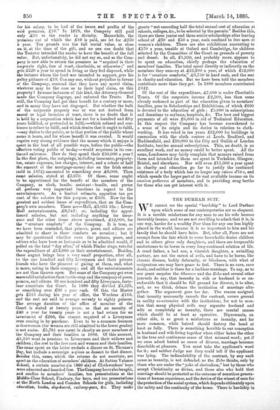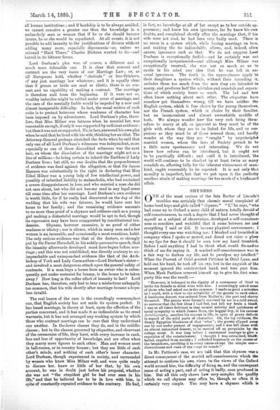THE DURHAM SUIT.
WE cannot see the special "hardship" to Lord Durham upon which some of our contemporaries are so eloquent. It is a terrible misfortune for any man to see his wife become incurably insane; and we are not unwilling to admit that it is, in one way, harder for a wealthy Peer than for any one less highly placed in the world, because it is so important to him and his family that he should have heirs. But, after all, Peers are not exempt from the fate which to some households denies children and to others gives only daughters, and there are irreparable misfortunes to be borne in every long-continued relation of life. A cruel father, a bad son, a vixenish daughter, a swindling partner, are not the rarest of evils, and have to be borne, like chronic disease, bodily deformity, or blindness, with what of resignation one may have grace to feel. There is no cure, save death, and neither is there for a luckless marriage. To say, as to our great surprise the Observer and the Echo and several other journals do say, that insanity in wife or husband is so unendurable that it should be full ground for divorce, is to alter, and, as we think, debase the institution of marriage altogether. The argument goes too far. The reason assigned, that insanity necessarily cancels the contract, covers ground in reality co-extensive with the institution ; for not to mention that many physical evils may separate husband and • wife as completely as insanity, there are mental causes which should be at least as operative. Dipsomania, on either side, is as great a misfortune as insanity, and far more common, while hatred should destroy the bond at least as fully. There is something horrible to our conception in husband and wife living together when either hates the other in the true and continuous sense of that misused word ; yet if we once admit hatred as cause of divorce, marriage becomes dissoluble at pleasure. You must take the applicant's word for it ; and neither Judge nor Jury could tell if the applicant was lying. The indissolubility of the contract, by any such cause as insanity, is not defended, as the Echo thinks, only by those who are under the " yoke of clericalism," but by those who accept Christianity as divine, and those also who hold that marriage should be protected as the outcome of countless generations of human experience, and the device of the wisest of men for the protection of the social system, which depends ultimately upon the safety and the continuity of the home. There is hardship in all human institutions ; and if hardship is to be always avoided, we cannot conceive a greater one than the knowledge in. a melancholy man or woman that if he or she should become insane, he or she would be repudiated. At all events, it is not possible to add insanity to the justifications of divorce without adding many more, especially dipsomania—as, unless we misread "Hard Times," Charles Dickens wanted to do—and hatred in its bitterer forms.
Lord Durham's plea was, of course, a different and a much more defensible one. It is clear that consent and contract are the very bases of our Marriage Law; or, as all Europeans hold, whether " clericals " or free-thinkers, of any just marriage law whatever; and it is equally clear that if groom or bride are mad or idiotic, there is no consent and no capability of making a contract. The marriage is therefore null from the beginning. If it were not so, wealthy imbeciles might be robbed under cover of marriage, and the care of the mentally feeble would be impeded by a new and almost insuperable difficulty. In fact, the usual motive of such snits is to protect heiresses whose weakness of character has been imposed on by adventurers. Lord Durham's plea, therefore, that Miss Milner was fatuous when he married her, was reasonable enough, if only it was supported by sufficient evidence ; but then it was not so supported. He, in fact, answered his own plea when he said that he lived with his wife, thinking her an idiot. The Attorney-General perhaps stretched the facts when he said that only one of all Lord Durham's witnesses was independent, more especially as one of those discredited witnesses was the next heir, on whom the dissolution of the marriage might act as a fine of millions—he being certain to inherit the Earldom if Lady Durham lives ; but still, no one doubts that the preponderance of evidence was dead against the allegation, or that Sir James Hannen was substantially in the right in declaring that Miss Ethel Milner was a young lady of low intellectual power, and possibly of inherited liability to melancholia, who had sustained a severe disappointment in love, and who married a man she did not care about, but who did not become mad in any legal sense till some time after her marriage. Lord Durham's own evidence is worth little, for if he really had discovered on the day of the wedding that his wife was fatuous, he would have sent her home to her family ; and the remaining evidence amounts to no more than proof of a shyness and coldness such as a young girl making a distasteful marriage would be apt to feel, though its expression may have been exaggerated by constitutional ten dencies. Shyness, however excessive, is no proof of either madness or idiotcy ; nor is silence, which in many men and a few women is an incurable, and occasionally a most vexatious, habit. The only serious evidence was that of the doctors, so strongly put by Sir Ferrer Herschell, in his subtly-persuasive speech, that the insanity afterwards developed must have begun before marriage ; and this was not established, was directly contrary to unimpeachable and unimpeached evidence like that of the Archbishop of York and Lady Carmarthen—Lord Durham's sister— and involved a most dangerous attack upon the general safety of contracts. If a man buys a house from an owner who is subsequently put under restraint for lunacy, is the house to be taken away P How long is the reflex effect of insanity to last ? Lord Durham has, therefore, only had to bear a misfortune unhappily too common, that his wife shortly after marriage became a hopeless invalid.
The real lesson of the case is the exceedingly commonplace one, that English society has not made its system perfect. It has based marriage, in theory at least, upon the affection of the parties concerned, and it has made it as indissoluble as its creed warrants, but it has not arranged any working system by which those who contract marriage can be sure that they understand one another. In the-lower classes they do, and in the middleclasses ; but in the classes governed by etiquettes, and observant of the ceremonies of life, they have: with every increase in rank, less and less of opportunity of knowledge, and are often when they marry mere figures to each other. Man and woman meet in ball-rooms, or in country houses; but they see little of each other's minds, and nothing of each other's inner character. Lord Durham, though experienced in society, and surrounded by women who knew Miss Milner well, and were quite ready to discuss her, knew so little of her that, by his own account, he was in doubt just before his proposal, whether she was not "the stupidest girl he had ever seen in his life," and that he believed her to be in love with him, in spite of constantly-repeated evidence to the contrary. He had,
in fact, no knowledge at all of her except as to her outside appearance; and knew his own ignorance, for he knew his own doubts, and complained shortly after the marriage that, if his wife were not mad, he had been very badly need. There is no sense in a system which, while basing marriage on love, and making the tie indissoluble, allows, and, indeed, often causes, ignorance such as that. We do not suppose Lord Durham is exceptionally foolish—and he certainly was act exceptionally inexperienced—and although Miss Milner was exceptionally reserved, she was not so much so as to excite in his mind any idea that be was left in unusual ignorance. The truth is, the upper-classes apply to their daughters a system which, without their intending it, secludes them too much from the men they are intended to marry, and produces half the mistakes and scandals and separations of which society hears so much. The lad and lase often know nothing about each other. The etiquettes have somehow got themselves wrong, till we have neither the English system, which is free choice by the young themselves, nor the French system, which is choice by their families, but an inconvenient and almost unworkable muddle of both. We always wonder how the very rich bring themselves to marry at all, so ignorant as they must be of the girls with whom they are to be linked for life, and so sus, picions as they must be of those around them, and hardly wonder at the way they are " caught " by unprincipled married women, whom the laws of Society permit to be a little more spontaneous and interesting. We do net know how reform can be introduced, but it ought not to be practically difficult ; and until it is introduced, the world will continue to be shocked by at /east twice as many scandals as, allowing fully for the inherent viciousness of mankind, ought reasonably to be expected. It is not only that morality is imperfect, bat that we put upon it the perfectly needless strain of making marriage far too much of a haphazard affair.



































 Previous page
Previous page